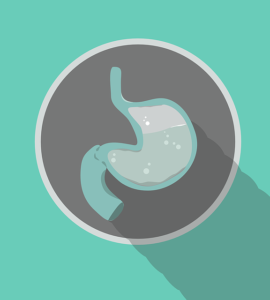BACKGROUND & AIMS:
A diet low in fermentable oligosaccharides, disaccharides, monosaccharides, and polyols (FODMAPs) often is used to manage functional gastrointestinal symptoms in patients with irritable bowel syndrome (IBS), yet there is limited evidence of its efficacy, compared with a normal Western diet. We investigated the effects of a diet low in FODMAPs compared with an Australian diet, in a randomized, controlled, single-blind, cross-over trial of patients with IBS.
METHODS:
In a study of 30 patients with IBS and 8 healthy individuals (controls, matched for demographics and diet), we collected dietary data from subjects for 1 habitual week. Participants then randomly were assigned to groups that received 21 days of either a diet low in FODMAPs or a typical Australian diet, followed by a washout period of at least 21 days, before crossing over to the alternate diet. Daily symptoms were rated using a 0- to 100-mm visual analogue scale. Almost all food was provided during the interventional diet periods, with a goal of less than 0.5 g intake of FODMAPs per meal for the low-FODMAP diet. All stools were collected from days 17-21 and assessed for frequency, weight, water content, and King’s Stool Chart rating.
RESULTS:
Subjects with IBS had lower overall gastrointestinal symptom scores (22.8; 95% confidence interval, 16.7-28.8 mm) while on a diet low in FODMAPs, compared with the Australian diet (44.9; 95% confidence interval, 36.6-53.1 mm; P < .001) and the subjects’ habitual diet. Bloating, pain, and passage of wind also were reduced while IBS patients were on the low-FODMAP diet. Symptoms were minimal and unaltered by either diet among controls. Patients of all IBS subtypes had greater satisfaction with stool consistency while on the low-FODMAP diet, but diarrhea-predominant IBS was the only subtype with altered fecal frequency and King’s Stool Chart scores.
CONCLUSIONS:
In a controlled, cross-over study of patients with IBS, a diet low in FODMAPs effectively reduced functional gastrointestinal symptoms. This high-quality evidence supports its use as a first-line therapy.
CLINICAL TRIAL NUMBER:
ACTRN12612001185853.
Abstract
This review summarizes the published clinical studies concerning the management of irritable bowel syndrome (IBS) using restriction of Fermentable Oligosaccharide, Disaccharide, Monosaccharide, and Polyols in the diet (low FODMAP diet). In recent years, the data supporting low FODMAP diet for the management of IBS symptoms have emerged, including several randomized controlled trials, case-control studies, and other observational studies. Unlike most dietary manipulations tried in the past to alleviate gastrointestinal symptoms of IBS, all studies on low FODMAP diet have consistently shown symptomatic benefits in the majority of patients with IBS. However, dietary adherence by the patients and clear dietary intervention led by specialized dietitians appear to be vital for the success of the diet. Up to 86% of patients with IBS find improvement in overall gastrointestinal symptoms as well as individual symptoms such as abdominal pain, bloating, constipation, diarrhea, abdominal distention, and flatulence following the diet. FODMAP restriction reduces the osmotic load and gas production in the distal small bowel and the proximal colon, providing symptomatic relief in patients with IBS. Long-term health effects of a low FODMAP diet are not known; however, stringent FODMAP restriction is not recommended owing to risks of inadequate nutrient intake and potential adverse effects from altered gut microbiota. In conclusion, the evidence to date strongly supports the efficacy of a low FODMAP diet in the treatment of IBS. Further studies are required to understand any potential adverse effects of long-term restriction of FODMAPs.

![]() Here’s the Link to the Webinar.
Here’s the Link to the Webinar.
 Scan Me!
Scan Me!


 “Several of the current medications for diabetes may be beneficial for treatment of fatty liver. These include pioglitazone and exenatide,” according to this
“Several of the current medications for diabetes may be beneficial for treatment of fatty liver. These include pioglitazone and exenatide,” according to this 
 In an
In an 
 Pract.
Pract. Access CareerBuilder’s dietitian
Access CareerBuilder’s dietitian  Start search
Start search 


 Motivational Interviewing Counseling Tips
Motivational Interviewing Counseling Tips